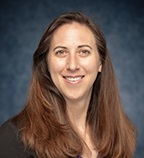Dr. Jenifer Shafer, Program Director at the Advanced Research Projects Agency-Energy (ARPA-E)
Nuclear Fuel Recycling and the Clean Energy TransitionThe Department of Chemistry Presents: Dr. Jenifer Shafer currently serves as a Program Director at the Advanced Research Projects Agency-Energy (ARPA-E). Her focus at ARPA-E is developing economic and proliferation resistant technologies to support advanced reactor deployment, as well as manage nuclear waste and used nuclear fuel.
Nuclear energy provides approximately 50% of the clean energy in the U.S. and 20% of the energy overall. While nuclear energy can be an attractive option due to the capacity factors of nuclear reactors and, consequently, competitive levelized cost of electricity questions remain regarding the long term handling and storage of nuclear waste. Expanding the delivery of nuclear energy help address climate change will ultimately require an effective plan for managing used nuclear fuel. Interestingly, only approximately 5% of the energy available in nuclear fuel is consumed when fuel is removed from a nuclear reactor. This means ~95% of the available energy is still available in a given used nuclear fuel bundle. Nuclear fuel recycling is a potentially attractive approach to minimize the generation of nuclear waste while maximizing the utilization of nuclear fuel. Nuclear fuel recycling has faced challenges to deployment due to both the unattractive economics associated with currently developed processes and the undesirable production of pure plutonium streams, which represent a proliferation concern. This presentation will focus on the technical opportunities for reprocessing technology to both improve the economics and limit the production of pure plutonium streams from such processes. The first part of the talk will consider research findings directly related to the development of hexavalent americium chemistry and how this can at least partially address both cost and nonproliferation considerations. The second part of the talk will focus on the Converting UNF Radioisotopes Into Energy (CURIE) Program at ARPA-E, which is focused on addressing these challenges, while also providing more information regarding ARPA-E – the U.S. moonshot energy agency.
BIO
Dr. Jenifer Shafer currently serves as the Associate Director for Technology and as a Program Director at the Advanced Research Projects Agency-Energy (ARPA-E). Her focus at ARPA-E is developing economic and proliferation resistant technologies to support advanced reactor deployment, as well as manage nuclear waste and used nuclear fuel. Before joining ARPA-E, Shafer served on the faculty at Colorado School of Mines as a Professor in the Chemistry Department and Nuclear Science & Engineering Program. Prior to that, she worked at Pacific Northwest National Laboratory. Shafer, an American Chemical Society Fellow, received a Ph.D. and B.S. in Chemistry from Washington State University and Colorado State University, respectively. She was the 2019 Chair of the American Chemical Society’s (ACS) Division of Nuclear Science & Technology, a member of the 2017 ACS Industrial & Engineering Chemistry Research’s Class of Influential Researchers, and a 2014 Department of Energy (DOE) Early Career awardee. She is the co-author of several book chapters, nearly 80 technical manuscripts, and has lead or collaborated on a number of projects for the Departments of Energy, Homeland Security, and Defense.
Technical Focus: Critical Materials; Grid; Industrial Decarbonization; Generation


